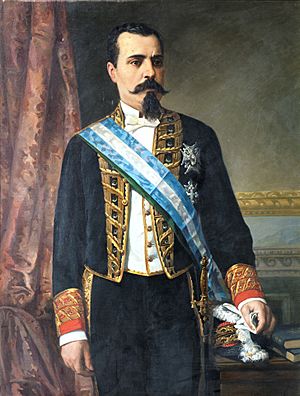Cristóbal Martín de Herrera facts for kids
Cristóbal Martín de Herrera was an important Spanish politician. He was born in Aldeadávila de la Ribera, Spain, on March 29, 1831. He passed away in Madrid, Spain, in 1878. During his life, he held a significant position in the Spanish government. He served as the Minister of Public Works during the time when Alfonso XII was the King of Spain.
Contents
Who Was Cristóbal Martín de Herrera?
Cristóbal Martín de Herrera was a Spanish politician who lived in the 1800s. He played a role in the government of Spain. Politicians are people who work in government to make decisions and create laws for a country.
Early Life and Education
Cristóbal Martín de Herrera was born in a town called Aldeadávila de la Ribera. This town is located in Spain. He grew up and received his education there. His early life prepared him for a career in public service.
His Role as a Minister
A minister is a high-ranking official in the government. They are in charge of a specific department. Cristóbal Martín de Herrera became the Minister of Public Works. This job involved overseeing important projects for the country.
What Did the Ministry of Public Works Do?
The Ministry of Public Works is responsible for building and maintaining important things. These include roads, bridges, and other public buildings. This work helps a country grow and makes life better for its people. As minister, Cristóbal Martín de Herrera helped manage these big projects.
Serving King Alfonso XII
Cristóbal Martín de Herrera served as a minister during the reign of King Alfonso XII. A "reign" is the period when a king or queen rules a country. King Alfonso XII was the King of Spain from 1874 to 1885. Working under the king meant Cristóbal Martín de Herrera was part of the royal government.
Impact on Spain
As Minister of Public Works, Cristóbal Martín de Herrera helped develop Spain's infrastructure. Infrastructure includes all the basic systems and facilities that a country needs. Good infrastructure helps people travel and trade more easily. This work was important for Spain's progress during that time.
See also
 In Spanish: Cristóbal Martín de Herrera para niños
In Spanish: Cristóbal Martín de Herrera para niños
 | Lonnie Johnson |
 | Granville Woods |
 | Lewis Howard Latimer |
 | James West |


